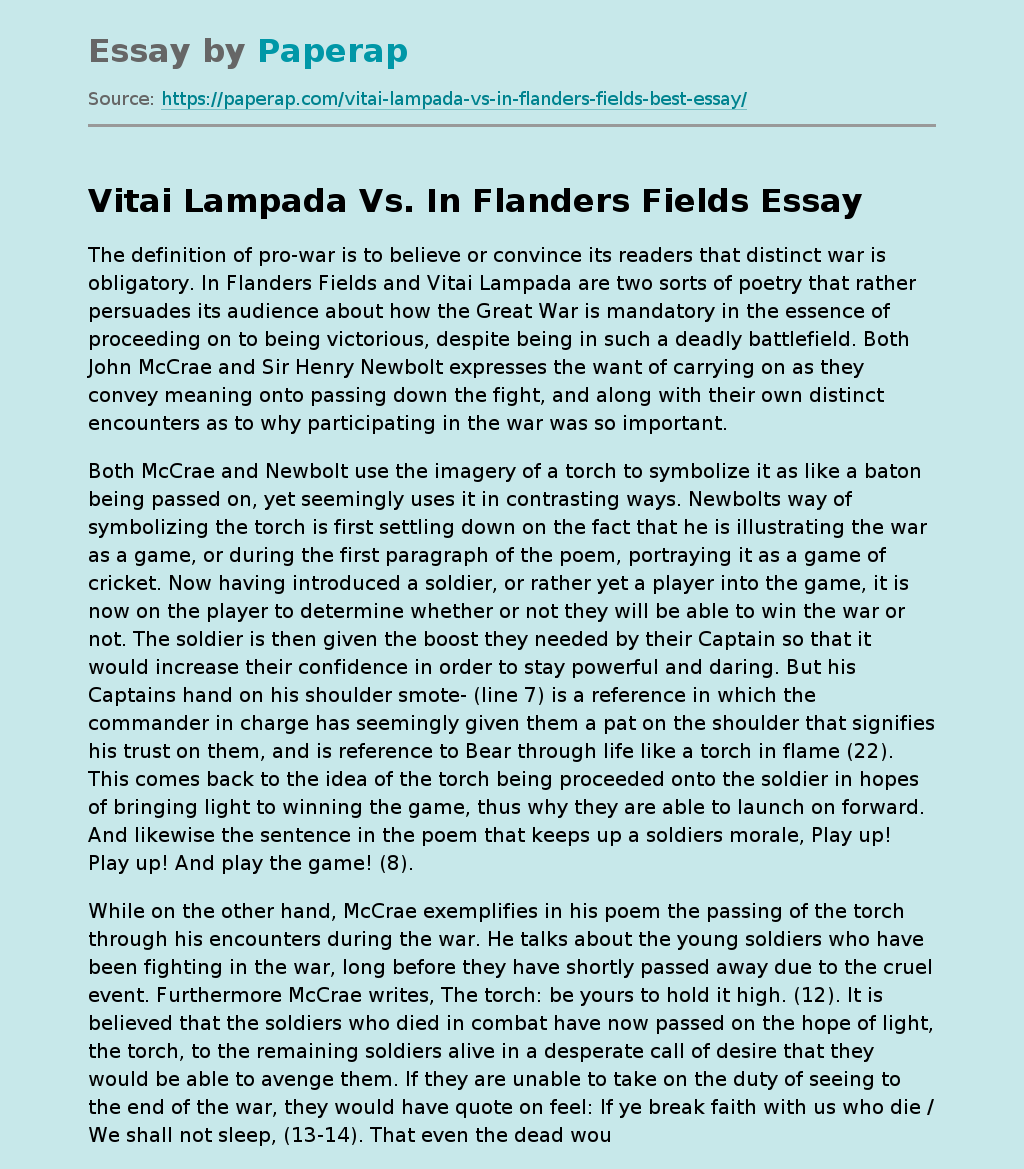The definition of pro-war is to believe or convince its readers that distinct war is obligatory. In Flanders Fields and Vitai Lampada are two sorts of poetry that rather persuades its audience about how the Great War is mandatory in the essence of proceeding on to being victorious, despite being in such a deadly battlefield. Both John McCrae and Sir Henry Newbolt expresses the want of carrying on as they convey meaning onto passing down the fight, and along with their own distinct encounters as to why participating in the war was so important.
Both McCrae and Newbolt use the imagery of a torch to symbolize it as like a baton being passed on, yet seemingly uses it in contrasting ways. Newbolts way of symbolizing the torch is first settling down on the fact that he is illustrating the war as a game, or during the first paragraph of the poem, portraying it as a game of cricket. Now having introduced a soldier, or rather yet a player into the game, it is now on the player to determine whether or not they will be able to win the war or not.
The soldier is then given the boost they needed by their Captain so that it would increase their confidence in order to stay powerful and daring. But his Captains hand on his shoulder smote- (line 7) is a reference in which the commander in charge has seemingly given them a pat on the shoulder that signifies his trust on them, and is reference to Bear through life like a torch in flame (22).
This comes back to the idea of the torch being proceeded onto the soldier in hopes of bringing light to winning the game, thus why they are able to launch on forward. And likewise the sentence in the poem that keeps up a soldiers morale, Play up! Play up! And play the game! (8).
While on the other hand, McCrae exemplifies in his poem the passing of the torch through his encounters during the war. He talks about the young soldiers who have been fighting in the war, long before they have shortly passed away due to the cruel event. Furthermore McCrae writes, The torch: be yours to hold it high. (12). It is believed that the soldiers who died in combat have now passed on the hope of light, the torch, to the remaining soldiers alive in a desperate call of desire that they would be able to avenge them. If they are unable to take on the duty of seeing to the end of the war, they would have quote on feel: If ye break faith with us who die / We shall not sleep, (13-14). That even the dead would not rest back in their slumber if they do not witness the conclusion of the Great War.
In both sets of poetry, they use tones in which have a great deal of attracting soldiers during the First World War and manages to strengthen their beliefs as to why fighting for this event was a necessity. In Vitai Lampada, it is suggestively speaking to its readers that this war they are fighting for is just a game, with hopes that they could possibly win it, and is seen in the following quotation, But the voice of a schoolboy rallies the ranks: (15). With the continuous use of metaphoric language, such as The sand of the desert is sodden red it is emphasizing that Newbolt wanted the war to feel as if its a game that must be played. Despite the hidden message of eerie bloodshed that has been happening, the sentences he uses such as Play up! Play up! And play the game! has really brought out the strength of the soldiers who are enveloped by seeing such a dreadful war be turned into a game instead.
Flanders Fields takes on with a different approach, as they instead have the dead call out to the living soldiers in which they must continue their own fight against multiple other countries. The poppies signify a big approach as it is in the shade of a very bright red. Through pastoral poetry, it may have signified forgetting, but in this case on the battlefield, it may have been interpreted as a drive for passion to go onward this never ending war, despite how much blood these soldiers have taken away. The dead people, despite them not being alive, must have died with continuous fear and rage, of not being allowed to finish their duty in the end. Therefore why it may have attracted other soldiers to fight forward despite the dreadful situation of the war, and also how critical it is to the deceased.
In conclusion, these two fantastic pieces of poems have certainly delivered their own reasonings of why war was obligatory through poetry. They indeed have contrasts against one another, as for Vitai Lampada was a soldier seeing the war as a game and wanting to fight faithfully for his Captain. On the other hand, Flanders Fields was seeing the dead soldiers passing on their batons to the living in hopes that they can fight the war they believed in would help their country. Although the one contrast that really stood out was the distinction or irony between the horrific war that took place and the beautiful death which occurred after. They both had such an inclined positive sort of way regarding the war, that even when theyre dead or in the brink of death, they still had this sturdiness that they must fight on. This is most likely the reason as to why these poems were seen as pro-war poetry; through their smart use of language and the lesson they exemplify.
Vitai Lampada Vs. In Flanders Fields. (2019, Dec 10). Retrieved from https://paperap.com/vitai-lampada-vs-in-flanders-fields-best-essay/

